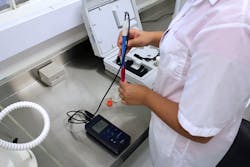Framework outlines use of real-world evidence in regulating in vitro diagnostics
The Medical Device Innovation Consortium (MDIC), a public-private partnership, released the final version of a framework outlining how to incorporate real-world evidence into the regulatory approval process for in vitro diagnostics (IVDs), according to the group’s website.
The framework – Real-World Clinical Evidence Generation: Advancing Regulatory Science and Patient Access for In Vitro Diagnostics (IVDs) – aims to help industry and U.S. Food and Drug Administration (FDA) consider when and how real-world data might be incorporated into product development and regulatory decision-making in support of clearance or approvals of in vitro diagnostics. It also outlines considerations for appropriate designs and statistical methods for generating real-world evidence (RWE) for regulatory submissions.
Pamela Goldberg, MBA, president and CEO of MDIC, said the importance of incorporating real-world evidence into the regulatory approval process was underscored by the COVID-19 pandemic. “As we work to control the COVID-19 pandemic and plan for future healthcare challenges, the use of RWE can expedite the development of IVDs. This will allow us to leverage the power of diagnostic testing for patient management and public health,” she said.
MDIC was formed in 2012 with representatives from industry, the FDA, the National Institutes of Health, the Centers for Medicare & Medicaid Services (CMS), patient advocacy groups and nonprofits. The framework builds off the FDA’s 2017 guidance, “Use of Real-World Evidence to Support Regulatory Decision-Making for Medical Devices: Guidance for Industry and Food and Drug Administration Staff.”
Although real-world evidence has been used by the FDA for years in many different contexts across the total product life cycle, there is less experience with real-world evidence across the range of IVD devices, especially in premarket regulatory decision-making, MDIC said.
Industry partners involved in creating the real-world framework were Abbott Diagnostics, Genomic Health, Hologic, IBM Watson, ICON, Johnson & Johnson, Roche Diagnostics, Sysmex America, and Thermo Fisher Scientific. Individual experts in regulatory science and policy, epidemiology, and biostatistics also participated in the process.

